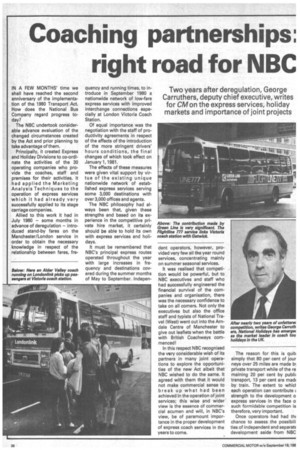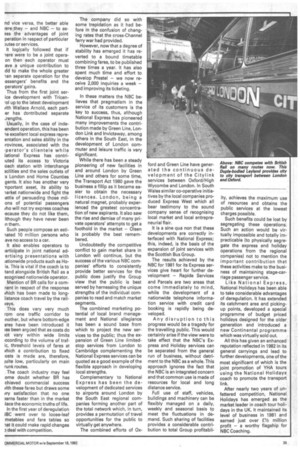Coaching partnerships: right road for NBC
Page 32

Page 33

If you've noticed an error in this article please click here to report it so we can fix it.
IN A FEW MONTHS' time we shall have reached the second anniversary of the implementation of the 1980 Transport Act. How does the National Bus Company regard progress today?
The NBC undertook considerable advance evaluation of the changed circumstances created by the Act and prior planning to take advantage of them.
Principally, it created Express and Holiday Divisions to co-ordinate the activities of the 30 operating companies who provide the coaches! staff and premises for their activities. it had applied the Marketing Analysis Techniques to the operation of express services which it had already very successfully applied to its stage carriage companies.
Allied to this work it had in July 1980 — some months in advance of deregulation — introduced stand-by fares on the Manchester/London service in order to obtain the necessary knowledge in respect of the relationship between fares, fre quency and running times, to introduce in September 1980 a nationwide network of low-fare express services with improved interchange connections especially at London Victoria Coach Station.
Of equal importance was the negotiation with the staff of productivity agreements in respect of the effects of the introduction of the more stringent drivers' hours conditions, the final changes of which took effect on January 1,1981.
The effects of these measures were given vital support by virtue of the existing unique nationwide network of established express services serving some 3,000 destinations with over 3,000 offices and agents.
The NBC philosophy had always been that, given these strengths and based on its experience in the competitive private hire market, it certainly should be able to hold its own with express services and holidays.
It must be remembered that NBC's principal express routes operated throughout the year with large increases in frequency and destinations covered during the summer months of May to September..Indepen dent operators, however, provided very few all the year round services, concentrating mainly on summer seasonal services.
It was realised that competition would be powerful, but to NBC executives and staff who had successfully engineered the financial survival of the companies and organisation, there was the necessary confidence to take on all comers. Not only the executives but also the office staff and typists of National Travel (West) went out into the Amdale Centre of Manchester to give out leaflets when the battle with British Coachways commenced!
In this respect NBC recognised the very considerable wish of its partners in many joint operations to explore the opportunities of the new Act albeit that NBC wished to do the same. It agreed with them that it would not make commercial sense to break up what had been achieved in the operation of joint services; this wise and wider view is the essence of commercial acumen and will, in NBC's view, be of paramount importance in the proper development of express coach services in the years to come. The reason for this is quit( simply that 80 per cent of jour neys over 25 miles are made b) private transport while of the re roaming 20 per cent by publk transport, 13 per cent are mad( by train. The extent to whict each operation can contribute .1 strength to the development o express services in the face o such formidable competition is therefore, very important.
Once operators had had tht chance to assess the possibili ties of independent and separate development aside from NBC nd vice versa, the better able fere they — and NBC — to asass the advantages of joint peration in respect of particular )utes or services.
It logically followed that if nere were to be a joint operaon then each operator must ave a unique contribution to dd to make the whole greater -tan separate operation for the assengers' benefits and the perators' gains.
Thus from the first joint serice development with Tricen-ol up to the latest development eith Wallace Arnold, each parter has c'sontributed separate Jengths.
Usually, in the case of indeendent operation, this has been le excellent local express repreentation and sales ability in the rovinces, associated with the perator's clientele while lational Express has contriuted its access to Victoria oach station with interchange 3cilities and the sales outlets of s London and Home Counties gents. It also has another very nportant asset, its ability to larket nationwide and fight the lathe of persuading those milons of potential passengers /ho will not try express coaches lecause they do not like them, [though they have never been In them.
Such people compose an estinated 10 million persons who ave no access to a car.
It also enables operators to articipate in joint national adertising presentations with lationwide products such as Hois. This is vital if the coach is to tand alongside British Rail as a acognised nationwide operator.
Mention of BR calls for a cornnent in respect of the response which has been made to longlistance coach travel by the raildays.
This does vary very much rom one traffic corridor to mother, but where bottom-edge ares have been introduced it as been argued that as costs do lot vary within wide limits Iccording to the volume of traf ic, threshold levels of fares at vhich a contribution to fixed osts is made are, therefore, iuite low, particularly on main runk routes.
The coach industry may feel ome doubt whether BR has chieved commercial success 'Rh these fares but draws some ery satisfaction that no one earns faster than in the market lace the economic truths of life.
In the first year of deregulation IBC went over to loose-leaf metables and fare tables so net it could make rapid changes ) deal with competition. The company did so with some trepidation as it had before in the confusion of changing rates that the cross-Channel ferry war had provided.
However, now that a degree of stability has emerged it has reverted to a bound timetable combining fares, to be published three times a year. It has also spent much time and effort to develop Prestel — we now receive 2,000 inquiries a week — and improving its ticketing.
In these matters the NBC believes that pragmatism in the service of its customers is the key to success, thus, although National Express has pioneered many improvements the contribution made by Green Line, London Link and Invictaway, among others in the South East, in the development of London commuter and leisure traffic is very significant.
While there has been a steady pioneering of new facilities in and around London by Green Line and others for some time, the Transport Act 1980 gave the business a fillip as it became easier to obtain the necessary licences. London, being a natural magnet, probably experienced the greatest concentration of new aspirants. It also saw the rise and demise of many private operators' attempts to get a foothold in the market — Olsen is probably the best remembered.
Undoubtedly the competitive conflict to gain market share in London will continue, but the success of the various NBC companies' efforts to consistently provide better services for the public does justify the Group view that the public is best served by harnessing the unique strengths of the individual companies to read and match market segments.
The combined marketing potential of local brand management and National allegiance has been a sound base from which to project the new services to the public; thus the expansion of Green Line limitedstop services from London to Cambridge complementing the National Express services can be quoted as a good example of the flexible approach in developing local strengths.
Complementary to National Express has been the development of dedicated services to airports around London by the South East regional companies forming another part of the total network which, in turn, provides a permutation of travel opportunities for the public to virtually get anywhere.
The combined efforts of Ox ford and Green Line have generated the continuous development of the Citylink services between Oxford/High Wycombe and London. In South Wales similar co-operative initiatives by the local companies produced Express West which all bear testimony to the sound company sense of recognising local market and local entrepreneurial flair.
It is a sine qua non that these developments are correctly interfaced with National Express; this, indeed, is the basis of the expansion of joint services with the Scottish Bus Group.
The results achieved by the NBC for 1981 for its Express services give heart for further development — Rapide Services and Parcels are two areas that come immediately to mind, while the development of a nationwide telephone information service with credit card booking is rapidly being developed.
Any disruption to this progress would be a tragedy for the travelling public. This would certainly arise if the view were to take effect that the NBC's Express and Holiday services can be separated from the general run of business, without detriment to the NBC as a whole. This approach ignores the fact that the NBC is an integrated concern and that common use is made of resources for local and long distance service.
Full use of staff, vehicles, buildings and machinery can be flexibly managed on a daily, weekly and seasonal basis to meet the fluctuations in demand. Such sharing of facilities provides a considerable contribution to total Group profitabil ity, achieves the maximum use of resources and obtains the public services at the lowest charges possible.
Such benefits could be lost by segregating these operations. Such an action would be virtually impossible and totally impracticable (to physically segregate the express and holiday operations from the regional companies) not to mention the important contribution that these activities make to the business of maintaining stage-carriage passenger service.
Like National Express, National Holidays has been able to take considerable advantages of deregulation. It has extended its catchment area and pickingup points, developed a special programme of budget priced holidays designed for the older generation and introduced a new Continental programme which was virtually sold out.
All this has given an enhanced reputation reflected in 1982 in its general carryings and lead to further developments, one of the most significant of which is the joint promotion of YHA tours using the National Holidays coach to promote the transport link.
After nearly two years of unfettered competition, National Holidays has emerged as the market leader in coach tour holidays in the UK. It maintained its level of business in 1981 and earned just over £1/2 million profit — a worthy flagship for NBC Coaching.














































